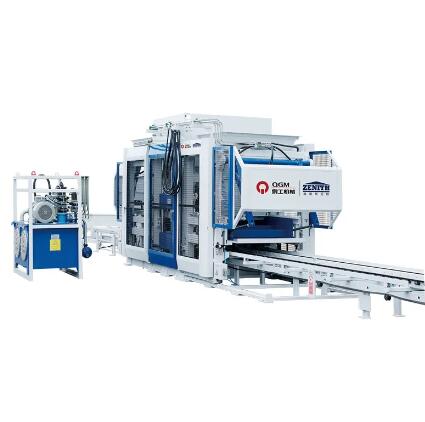What is an Intelligent Non-Burning Brick Machine and How Does It Revolutionize the Construction Industry
2024-11-06
In the ever-evolving construction industry, sustainable practices and innovative technologies are becoming more important than ever. One such innovation that is making waves is the Intelligent Non-Burning Brick Machine. This machine offers an eco-friendly solution to traditional brick manufacturing by producing high-quality bricks without the need for firing or burning. In this post, we’ll explore what an Intelligent Non-Burning Brick Machine is, how it works, and the benefits it brings to the construction sector.
What is an Intelligent Non-Burning Brick Machine?
An Intelligent Non-Burning Brick Machine is an automated system designed to manufacture bricks without the need for traditional firing in a kiln. Unlike conventional brick production, which involves high-temperature baking (burning) to harden the bricks, the non-burning process relies on high-pressure molding and curing techniques. This process not only reduces energy consumption but also minimizes harmful emissions associated with brick firing.
The machine is equipped with advanced sensors and a control system, making it "intelligent." These features allow the machine to adjust settings automatically to optimize production efficiency, consistency, and the quality of the bricks. The result is a sustainable, energy-efficient method of brick production suitable for a wide variety of applications, from residential buildings to large-scale infrastructure projects.
How Does the Intelligent Non-Burning Brick Machine Work?
The process of manufacturing bricks with an Intelligent Non-Burning Brick Machine is as follows:
1. Raw Material Preparation:
The primary raw materials for making non-burning bricks are often fly ash, cement, sand, slag, and other industrial waste materials. These raw materials are processed and mixed to form a slurry or paste, which is then fed into the machine.
2. Molding and Compression:
The machine uses high-pressure compression to mold the brick paste into uniform shapes. This pressure consolidates the materials, ensuring that the bricks are dense and strong enough for use in construction. The molding process is controlled by intelligent sensors, which adjust the pressure and timing to maintain consistent quality.
3. Curing:
After molding, the bricks are cured under controlled conditions, typically using steam or chemical additives. The curing process hardens the bricks without the need for burning. The intelligent system monitors temperature and humidity levels during curing to ensure optimal conditions for the bricks to gain maximum strength.
4. Quality Control:
Throughout the entire production process, the Intelligent Non-Burning Brick Machine uses automated quality control systems, such as sensors, cameras, and real-time monitoring software, to check for any defects or inconsistencies in the bricks. This ensures that only bricks of the highest quality are produced.
Benefits of Using an Intelligent Non-Burning Brick Machine
1. Energy Efficiency
One of the primary advantages of the non-burning brick-making process is its reduced energy consumption. Traditional brick kilns require significant amounts of energy to reach the high temperatures necessary for firing. In contrast, the non-burning brick machine operates with minimal energy input, making it much more energy-efficient.
2. Environmental Impact Reduction
Burning bricks in kilns contributes to significant CO2 emissions, leading to air pollution and environmental degradation. The Intelligent Non-Burning Brick Machine significantly reduces these emissions by eliminating the need for high-temperature firing. Additionally, the machine often uses industrial waste materials like fly ash, helping to reduce waste and promote recycling.
3. Cost-Effectiveness
Traditional brick production requires substantial investment in kiln infrastructure and ongoing fuel costs for firing. In contrast, the non-burning brick-making process involves lower operational costs and requires less maintenance. As a result, businesses can produce high-quality bricks at a lower cost, making the process more affordable and profitable.
4. Sustainable and Green Construction
With the construction industry increasingly shifting towards sustainability, non-burning bricks offer a green alternative to conventional bricks. They are made from eco-friendly materials, require less energy, and have a lower carbon footprint. Builders and contractors are increasingly turning to these bricks to meet sustainability standards and green building certifications.
5. Higher Strength and Durability
Non-burning bricks made by intelligent machines are often stronger and more durable than traditional bricks. The use of high-pressure molding and controlled curing processes results in bricks that can withstand harsher weather conditions and are more resistant to cracking or crumbling.
6. High Production Efficiency
The Intelligent Non-Burning Brick Machine is highly automated, meaning that the production process is faster and requires less manual labor. With intelligent sensors and automated controls, the machine can adjust parameters to maintain high output levels while ensuring consistent quality across every batch of bricks.
Applications of Intelligent Non-Burning Brick Machines
- Residential Construction: Non-burning bricks are ideal for building homes, as they are strong, durable, and energy-efficient.
- Commercial and Industrial Buildings: These bricks are used in the construction of office buildings, factories, warehouses, and other commercial structures.
- Infrastructure Projects: Large-scale infrastructure projects, such as roads, bridges, and public buildings, can also benefit from the use of non-burning bricks.
- Urban Development: With the global push for sustainable urban development, non-burning bricks offer an eco-friendly option for building cities with a smaller environmental footprint.
The Intelligent Non-Burning Brick Machine represents a significant leap forward in the evolution of construction materials. By eliminating the need for traditional brick firing and incorporating automation, this machine not only makes brick production more sustainable but also increases efficiency, reduces costs, and improves product quality. As the construction industry continues to focus on sustainable practices, the intelligent non-burning brick machine will play a crucial role in shaping the future of green building materials.



